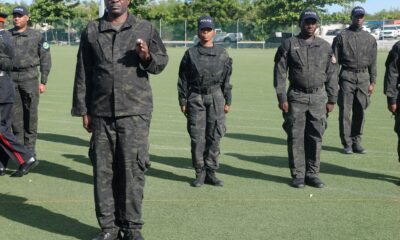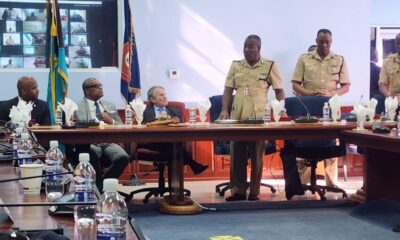From: Bahamas Information Services
January 15, 2025
NASSAU, The Bahamas — Cybersecurity is a national security issue for The Bahamas, and indeed the world, Minister of National Security, the Hon. Wayne Munroe, K.C., told local, regional and international delegates attending the Opening Session of the Third Annual Computer Incident Response Team’s (CIRT-BS) three-day Cybersecurity Conference and ITU Regional CyberDrill.
Minister Munroe challenged delegates to continue to build a better mousetrap for those “bad actors” who will change and evolve in an effort to take advantage of new cybersecurity resilience initiatives designed to strengthen digital ecosystems.
The Conference has four key objectives: To enhance The Bahamas’ cybersecurity preparedness through the National Cybersecurity Strategy and associated workshops; To conduct a simulated CyberDrill to test and assess the effectiveness of incident response plans; To foster unit and cooperation among stakeholders, including government agencies, private sector organizations, academia, and civil society in responding to cyber threats, and to strengthen technical expertise in areas such as incident response, threat intelligence, digital forensics, and emerging technologies such as Artificial Intelligence (A.I.), through hands-on training.
Its aims include promoting public awareness by highlighting the importance of cybersecurity at all levels of society and encouraging proactive measures to safeguard personal and organizational data, and to drive policy innovation by facilitating discussions on regulatory frameworks and strategies to “future-proof” the digital ecosystem in The Bahamas and the region.
Delivering the Keynote Address, Mr. Munroe said The Bahamas is committed to building a secure digital ecosystem that safeguards critical infrastructure, businesses, and individuals from cyber threats, making cybersecurity a national priority for the government.
Some of the initiatives undertaken in this regard includes the launch of CIRT-BS and its operational services in January 2024, approval (March 2024) and official launch of the country’s National Cybersecurity Strategy (NCS) in December 2024; Drafting of critical cybersecurity legislation; Membership in the prestigious Forum of Incident Response and Security Teams (FIRST), with LAC4 (Latin American and Caribbean Cyber Competence Centre) membership soon to follow; Development of a child online protection strategy, in addition to the hosting of numerous capacity-building events such as the CIRT-BS Cybersecurity Conference.
The National Security Minister had a “bit of advice” for delegates — to build a better mousetrap.
“Change, progress, create opportunities, not just for economic advancement, but for bad actors who seek to exploit them, and so as change is rapid, criminal elements, bad actors, will seek to exploit that change. Cybersecurity and resilience is meant to address that,” Mr. Munroe said.
“Bad actors will evolve, they always do. Once you have found an answer, the will begin to seek another path, you can be assured of that. And so regardless of the exercises you will run, and the success you will have with it, be assured that as soon as you close one door, they will seek another. And so what do you have to do from today out, my advice to you is the same advice I give the security forces in this country, you will always be involved in what we call seeking to build a better mousetrap, because as the mice figure out the one you have built, you will have to build a better one. That should be your objective today. With all of the bright minds involved in this exercise I am confident that will be achieved.”
Bahamian officials say the conference holds “immense significance” for the nation, region, and indeed the global community “as we come together to tackle one of the most critical issues of our time — cybersecurity.”
They add that in a world where technology influences every aspect of life — from governance to commerce, to personal communication — the threats to the country’s digital infrastructure are growing increasingly sophisticated. The conference, with its theme of “Building Shared Cyber Resilience,” is hailed as being both timely and vital, as it “provides opportunities to combine collective knowledge, strengthen defenses, and work together to ensure the security and stability of an interconnected digital world.”
“Achieving the vision of a ‘secure and trusted digital society’ requires collaboration, dedication, and active participation from every corner of society — government, private sector, academia, civil society, and individuals. We cannot rely on a single entity; this is a collective endeavor,” officials add.
(BIS Photo – Conference attendees)/Kristaan Ingraham)


 News6 days ago
News6 days ago
 Caribbean News1 week ago
Caribbean News1 week ago
 News6 days ago
News6 days ago
























